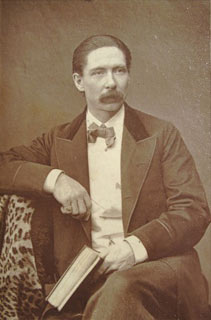JOHN NEVIL MASKELYNE
(December 22, 1839 - May 18, 1917)

 John
Nevil Maskelyne was born in 1839, in Cheltenham, Gloucestershire,
England. John
Nevil Maskelyne was born in 1839, in Cheltenham, Gloucestershire,
England.
Maskelyne was trained as a watchmaker and was an important Victorian
inventor. His most important invention was a lock that required
a penny to operate, that was used to lock the doors on public toilets
in London.
Maskelyne had an interest in trickery and became an amateur conjurer,
alongside George Alfred Cooke. Soon the pair worked their way up
to become experts in the field.
Maskelyne had a genuine dislike for spiritualist frauds. After
seeing a performance of the fraudulent spiritualists, the Davenport
Brothers, he decided to expose their fraud by recreating their act
using no actual supernatural methods. Alongside Cooke, his first
professional performance was billed as follows:
"Messrs. Maskelyne and Cooke, the only successful rivals
of the Davenport Brothers, will give a grand exposition of the entire
public séance in open daylight, showing the possibility of
accomplishing, without the aid of spiritualism, not only all the
Davenport's tricks, but many others, original and more astounding,
including escaping from a box."
Maskelyne and Cooke later went on to perform a long run at the
Egyptian Hall in Piccadilly, calling it "England's Home of
Mystery" and performing various feats.
Maskelyne made it his lifelong mission to dispel the notion of
supernatural powers. In 1914, he founded the Occult Committee whose
remit was to "investigate claims to supernatural power and
to expose fraud."
His need to expose frauds also spiked an interest in the tricks
of crooked gamblers. In 1894 he published Sharps and Flats. The
book became an instant classic the moment it hit the shelves and
remains a source of inspiration to all researches of crooked gambling,
to this day.
Maskelyne died of pneumonia, on May 18, 1917, in his flat on St. George's Hall, in London.

|

